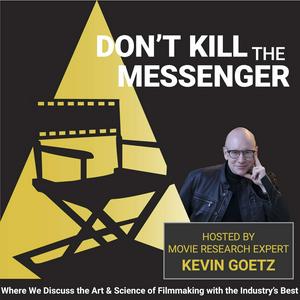Jerry Bruckheimer (Producer) on Making Blockbusters, Audience Testing, and 50+ Years in Hollywood
Send Kevin a Text MessageIn this episode of Don't Kill the Messenger, host Kevin Goetz sits down with legendary producer Jerry Bruckheimer, the mastermind behind billion-dollar blockbusters, including Top Gun, Pirates of the Caribbean, Bad Boys, Beverly Hills Cop, and the television shows CSI, The Amazing Race, and Fire Country. Bruckheimer shares insights into his detailed approach to filmmaking, the power of test screenings, and what it takes to consistently deliver crowd-pleasing entertainment.The Power of Audience Testing (01:22)Bruckheimer emphasizes the crucial role audience research has played in his success, citing examples like Armageddon and Bad Boys: Ride or Die, which both saw significant improvements in test screening scores.The Origins of Top Gun and Casting Tom Cruise (08:49)Bruckheimer reveals how Top Gun almost didn't get made due to studio concerns about airplane movies, and his brilliant strategy of arranging for Tom Cruise to fly with the Blue Angels, which sealed Cruise's commitment to the project.Learning from The Lone Ranger (18:05)Goetz and Bruckheimer analyze why The Lone Ranger didn't connect with audiences, emphasizing how budget discussions overshadowed the creative vision and the importance of early concept testing.F1: The Upcoming Blockbuster (24:20)Bruckheimer details the three-year process of making F1, from convincing Formula 1 teams to participate to achieving record-breaking test screening scores.Working with Hollywood Legends (29:22)Bruckheimer shares personal stories about collaborating with icons like Gene Hackman, Will Smith, Eddie Murphy, and Johnny Depp.Television Empire and The Amazing Race (40:01)With 10 Emmy wins for The Amazing Race and over 2000 episodes across franchises like CSI and Fire Country, Bruckheimer discusses his approach to television and how he maintains the quality across multiple projects.Over the course of the interview, Bruckheimer shares how his pursuit of perfection, genuine respect for audiences, and ability to adapt while maintaining his core philosophy, "I don't make movies for anybody but the audience," contributed to his mega success. His insights reveal the strategic thinking and collaborative spirit behind some of Hollywood's biggest franchises.Host: Kevin GoetzGuest: Jerry BruckheimerProducer: Kari CampanoWriters: Kevin Goetz, Darlene Hayman, Nick Nunez, and Kari CampanoAudio Engineer: Gary Forbes (DG Entertainment) For more information about Jerry Bruckheimer:Wikipedia: https://en.wikipedia.org/wiki/Jerry_BruckheimerIMDB: https://www.imdb.com/name/nm0000988/Instagram: https://www.instagram.com/jerrybruckheimer/?hl=en For more information about Kevin Goetz:Website: www.KevinGoetz360.comAudienceology Book: https://www.simonandschuster.com/books/Audience-ology/Kevin-Goetz/9781982186678How to Score in Hollywood: https://www.simonandschuster.com/books/How-to-Score-in-Hollywood/Kevin-Goetz/9781982189860Instagram, Facebook, Twitter, YouTube, TikTok, Substack: @KevinGoetz360Linked In @Kevin Goetz



